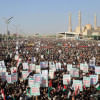The fight for Jihadi leadership

The fight between al-Qa'ida and the Islamic State (IS) has been going on since 2006 when the latter split from al-Qa'ida and declared the establishment of the Islamic State of Iraq. Today the IS finds itself embroiled against forces of several nations and is losing ground in both Iraq and Syria. Some political commentators have been predicting its impending defeat in the battlefield, but there is another war going on in the sidelines and that is the fight between the old guard (al-Qa'ida) and the IS for leadership of the global jihadist movement. On July 21, al-Qa'ida leadership issued a statement saying that fighters or groups making a pledge to Abu Bakr al-Baghdadi meant being a "partner in every curse upon the Muslims" including "killing thousands of Mujhahideen".
And as IS loses ground in the Middle East, it is branching outwards to carry out terrorist hits far from its stronghold – in Europe and in Asia. Today we have various jihadist movements in different parts of the world and al-Qa'ida and IS have been vying for their loyalty. We see local home grown jihadi outfits in Bangladesh like Ansarulla B team, JMB and others declaring allegiance to one of the two. The breaking of ties with al-Qa'ida as affiliates the world over found new direction when IS took over Mosul in Iraq and declared a caliphate in 2014 and the battle for the hearts-and-minds of the global jihadi movement was born. Indeed, over the last two years, al-Qa'ida has seen its dominance over its custodian role in many countries as factions have weaned away and found guidance under the more brutal IS in counties like Algeria, Pakistan and Yemen; where groups like the Boko Haram and Ansar beit al Madisi have split from al-Qa'ida and pledged allegiance to the IS.
History is full of instances where new and more violent elements within groups have split from the old guard vying for control and leadership. According to Chris Watts, Senior Fellow at the Center for Cyber and Homeland Security at George Washington University, this has been going on for decades in the Middle East: "In Egypt, during the 1990s, the Muslim Brotherhood, faced off against younger, more violent jihadist groups. Similarly, Algeria in the 1990s witnessed the emergence of the FIS (Islamic Salvation Front) in opposition to the Muslim Brotherhood. FIS leaders were then assassinated in mid-1993 by the more junior and violent Armed Islamic Group (GIA), which ultimately declared war on the FIS and Islamic Salvation Army (AIS) and killed hundreds of Islamists. Internal fractures and splintering among Palestinian extremists, whether the Palestinian Liberation Organisation (PLO), Palestinian Islamic Jihad, Hamas, or Fatah, show a persistent trend of the young breaking away from their older forefathers. In all of these cases, younger extremists – detecting a pause, moderation, or shortcomings of the older generation – believe a new strategic direction incorporating greater violence will bring about the ultimate victory. Al-Qa'ida and the Islamic State's modern global jihad follow a similar pattern, where each generation of foreign fighters have splintered from their forefathers and become increasingly violent and aggressive."
When we take into account the fact that there has been a realignment of focus out of the Middle East to the Indian subcontinent by both al-Qa'ida and the IS, primarily because Bangladesh sits strategically between two major targeted countries, i.e. India and Myanmar, there really is no room for complacence. Yes, the government has done a commendable job till date in making it near impossible for any rebel group to operate from Bangladeshi soil to launch operations in neighbouring countries, but the Jihadi threat is a whole different ball game. And when we throw in Jihadi competition between al-Qa'ida and IS into the volatile brew, one cannot but agree with the Prime Minister when she says there will be more attacks.
The Gulshan attack in July put the global media spotlight on Bangladesh. A brutal and violent attack that took international headlines by storm and was successfully claimed by the IS as a "hit" – the first of its kind on Bangladeshi soil, in the heart of the most protected part of the capital city. It was carried out by members of an affiliate which swore loyalty to the IS; whether we choose to agree with that statement or not is another argument altogether. It is safe to assume that al-Qa'ida in the Indian subcontinent (AQIS), that aims to fight the governments of Pakistan, India, Myanmar and Bangladesh, would like to outshine its upstart breakaway faction with something equally, if not more deadly. Going by what has dominated local print and electronic media for the last couple of weeks by the number of suspected militants either being killed or apprehended – something is brewing somewhere.
So where does that leave us? How do we counteract this phenomenon of more violent, more aggressive behaviour? We can certainly take lessons from countries that have fought off their versions of jihadi revolt and one must remember that the battle for containing any such movement, whether it is in its nascent form or in maturity is not one that will be dealt with in months, but years. This remains an ideological war, and ideas must be fought with ideas as much as with feat of arms; it involves wider participation of communities and greater debate on what religion is all about. Treating the jihadi threat as merely a law enforcement issue will only stoke the fires of extremism, not help extinguish it.
The writer is Assistant Editor, The Daily Star.

 For all latest news, follow The Daily Star's Google News channel.
For all latest news, follow The Daily Star's Google News channel. 









Comments